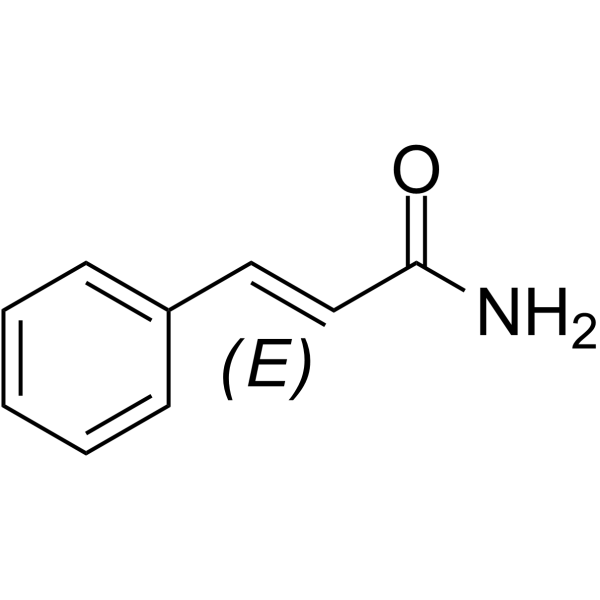
(E)-Cinnamamide
CAS No. 22031-64-7
(E)-Cinnamamide( trans-Cinnamamide )
Catalog No. M26562 CAS No. 22031-64-7
(E)-Cinnamamide is the less active isomer of Cinnamamide which is an effective non-lethal chemical repellent suitable for reducing avian pest damage.
Purity : >98% (HPLC)
 COA
COA
 Datasheet
Datasheet
 HNMR
HNMR
 HPLC
HPLC
 MSDS
MSDS
 Handing Instructions
Handing Instructions
| Size | Price / USD | Stock | Quantity |
| 500MG | 37 | In Stock |


|
| 1G | Get Quote | In Stock |


|
Biological Information
-
Product Name(E)-Cinnamamide
-
NoteResearch use only, not for human use.
-
Brief Description(E)-Cinnamamide is the less active isomer of Cinnamamide which is an effective non-lethal chemical repellent suitable for reducing avian pest damage.
-
Description(E)-Cinnamamide is the less active isomer of Cinnamamide which is an effective non-lethal chemical repellent suitable for reducing avian pest damage.
-
In Vitro——
-
In Vivo——
-
Synonymstrans-Cinnamamide
-
PathwayOthers
-
TargetOther Targets
-
RecptorHuman Endogenous Metabolite
-
Research Area——
-
Indication——
Chemical Information
-
CAS Number22031-64-7
-
Formula Weight147.177
-
Molecular FormulaC9H9NO
-
Purity>98% (HPLC)
-
SolubilityIn Vitro:?DMSO : 100 mg/mL (679.49 mM)
-
SMILESNC(=O)\C=C\c1ccccc1
-
Chemical Name——
Shipping & Storage Information
-
Storage(-20℃)
-
ShippingWith Ice Pack
-
Stability≥ 2 years
Reference
1.Swain J, et al. 1-Naphthol as an ESPT fluorescent molecular probe for sensing thermotropic microenvironmental changes of pluronic F127 in aqueous media. Phys Chem Chem Phys. 2015 Jul 14;17(26):16752-9.
molnova catalog



related products
-
Benfluorex hydrochlo...
Benfluorex is an anorectic and hypolipidemic agent that is structurally related to fenfluramine.
-
Ganoderic acid M
Ganoderic acid Me and/or ganoderic acid T have obvious action for inhibiting human tumor cell growth or proliferation, at the same time its toxicity for normal cells is low.
-
Barbadin
Barbadin is a novel and specific inhibitor of β-arrestin/β2-adaptin interaction with an IC50 value of 19.1 μM for β-arestin1 and 15.6 μM for β-arestin2.



 Cart
Cart
 sales@molnova.com
sales@molnova.com


